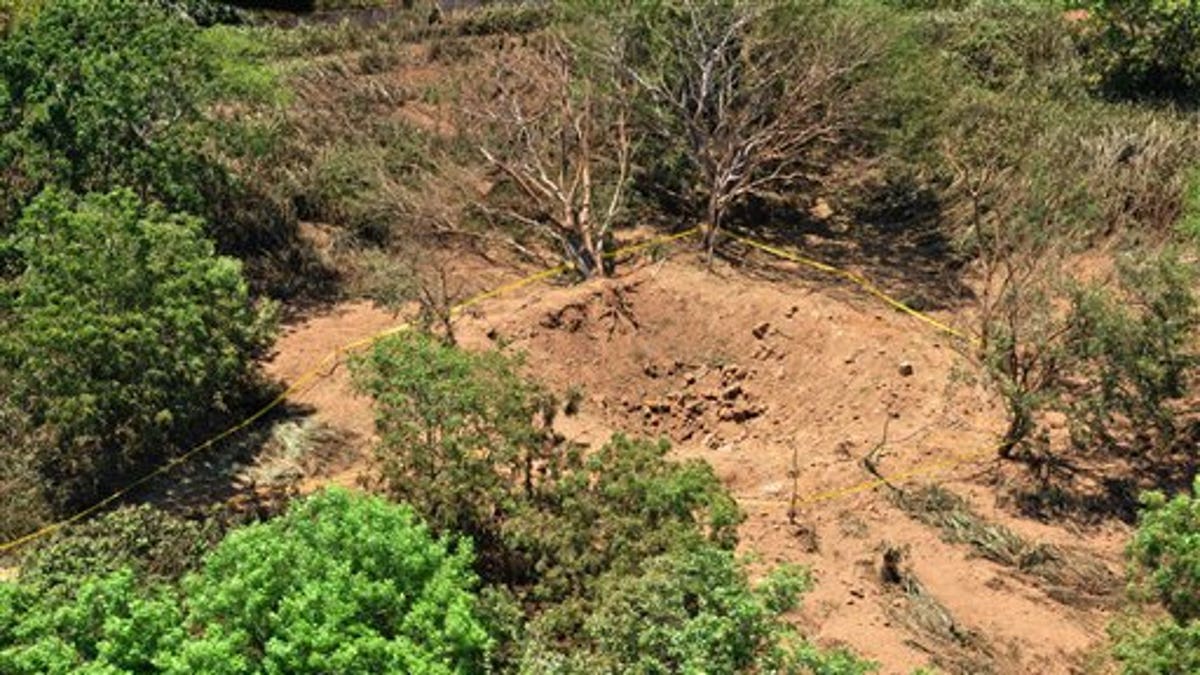
In this Sunday Sept. 7, 2014, publicly distributed handout photo provided by the Nicaraguan Army shows an impact crater made by a small meteorite in a wooded area near Managua's international airport and an air force base. Nicaraguan government spokeswoman Rosario Murillo said Sunday that a loud boom heard overnight by residents of the capital was a "relatively small" meteorite that "appears to have come off an asteroid that was passing close to Earth." (AP Photo/Nicaraguan Army)
MANAGUA, Nicaragua (AP) – Outside experts raised doubts on Monday about whether a loud boom and a gaping crater found in Nicaragua this weekend were caused by a meteorite, as the government of the Central American nation has said.
The U.S. National Aeronautics and Space Administration said that while a meteorite cannot be ruled out, the lack so far of any eyewitness accounts of a fireball lighting up the nighttime sky outside the capital city of Managua, suggests something else was likely behind the event.
Photos showed a crater about 39 feet wide in a wooded area near Managua's international airport. Bill Cooke, head of NASA's Meteoroid Environment Office, estimated that it would have been created by a blast of roughly the energy equivalent of 1 ton of TNT.
NASA said in a statement that a meteor capable of that would have created a ball of flame visible over a wide area. About 1.5 million people live in Managua.
"For something to produce a hole in the ground that big, it would have generated a very bright fireball. And nothing was reported ... despite the population," Cooke said. "So I'm very skeptical."
There was no word so far of any meteorite fragments being found inside the crater.
Government spokeswoman Rosario Murillo said Sunday that a "relatively small" meteorite was responsible for the phenomenon. The following afternoon she said scientists from other countries had expressed interest in coming to investigate.
Jaime Incer, a scientist who advises the Nicaraguan presidency on environmental matters, said he could not confirm for sure that the crater was caused by a meteorite, but said that, "among the possibilities, it's one of the most likely." He said he suspects a meteorite composed of rock.
Incer said it is possible nobody was looking up at the heavens when the event took place late at night.
Residents described it as a loud boom.
"I was walking back home after playing billiards, and suddenly I heard the explosion and felt the shockwave, which was very strong," said Victor Gutierrez, a 38-year-old mechanic who lives less than a mile from the site of the crater. "I didn't see anything in the sky either before or after."
Incer and Lindley Johnson, a program executive for NASA's Near-Earth Object Observations Program, agreed that whatever happened in Nicaragua had nothing to do with an asteroid that flew past Earth this weekend.
At the time of the explosion, the object known as 2014 RC was about as far away as the moon, Johnson said. 2014 RC's passage close to Earth happened some 13 hours later.
Cooke said there could be any number of alternative explanations, ranging from ordinance to "someone out blowing things up."
Follow us on twitter.com/foxnewslatino
Like us at facebook.com/foxnewslatino








































